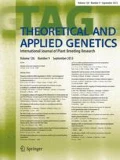Summary
Using a novel procedure based on the polymerase chain reaction, we have developed a rapid, efficient, and economical method for identifying plant genotypes. The arbitrarily primed polymerase chain reaction (AP-PCR) generates reproducible fingerprints from any organism, without the need for DNA sequence information. These fingerprints include DNA fragment polymorphisms that can be (1) used for varietal identification and parentage determination, (2) followed in segregating populations produced by crosses, (3) used as markers for the construction of genetic maps, and (4) used to generate dendograms of phylogenetic relationships, especially at the intraspecific level. AP-PCR requires only minute quantities of DNA (10–25 ng per reaction) and therefore can be used in situations in which DNA is limiting. We demonstrate the use of AP-PCR to identify inbred parents of hybrid maize plants in double-blind experiments.
Similar content being viewed by others
References
Bishop D, Skolnick MH (1980) Numerical considerations for linkage studies using polymorphic DNA markers in humans. Banbury Rep. 4: cancer incidence in defined populations. Cold Spring Harbor Laboratory, Press Cold Spring Harbor/NY, pp 421–433
Bolstein D, White RL, Skolnick MH, Davis RW (1980) Construction of a genetic linkage map in man using restriction fragment length polymorphisms. Am J Hum Genet 32:314–331
Burr B, Evola SV, Burr FA, Beckman JS (1983) The application of restriction fragment polymorphisms to plant breeding. In: Setlow JK, Hollaender A (eds) Genetic engineering principles and methods, vol 5. Plenum Press, New York London, pp 45–59
Doyle JJ, Doyle JL (1987) A rapid DNA isolation procedure for small quantities of fresh leaf tissue. Phytochem Bull 19:11–15
Helentjaris T, Weber DF, Wright S (1986) Use of monosomics to map cloned DNA fragments in maize. Proc Natl Acad Sci USA 83:6035–6039
Landry BS, Kesseli RV, Farrarra B, Michelmore RW (1987) A genetic map of lettuce (Lactuca sativa L.) with restriction fragment length polymorphism, isozyme, disease resistance, and morphological markers. Genetics 116:331–337
Lerman LS (1986) Electrophoresis of DNA in denaturing gradient gels. In: Setlow JK, Hollaender A (eds) Genetic engineering, vol 8. Plenum, New York, pp 221–240
Lerman LS, Fischer SG, Hurler I, Silverstein K, Lumelsky N (1984) Sequence-determined DNA separations. Annu Rev Biophys Bioeng 13:399–423
McCouch SR, Kochert G, Yu ZH, Wang ZY, Kush GS, Coffman WR, Tanksley SD (1988) Molecular mapping of rice chromosomes. Theor Appl Genet 76:815–829
Riedel GE, Swanberg SL, Kuranda KD, Marquette K. LaPan P, Bledsoe P, Kennedy A, Lin B-Y (1990) Denaturing gradient gel electrophoresis identifies genomic DNA polymorphism with high frequency in maize. Theor Appl Genet 80:1–10
Soller M, Beckmann JS (1983) Genetic polymorphism in varietal identification and genetic improvement. Theor Appl Genet 67:25–33
Tanksley SD, Mutschler MA, Rick CM (1987) Linkage map of the tomato (Lycopersicon esculentum) (2n=24). In: O'Brien SJ (ed) Genetic maps 1987. A compilation of linkage and restriction maps of genetically studied organisms. Cold Spring Harbor Laboratory Press, Cold Spring Harbor/NY, pp 655–669
Welsh J, McClelland M (1990) Fingerprinting genomes using PCR with arbitrary primers. Nucleic Acids Res 18:7213–7218
Welsh J, McClelland M (1991) Species-specific genomic fingerprints produced by PCR with consensus tRNA gene primers. Nucleic Acids Res 19:861–866
Welsh J, Petersen C, McClelland M (1991) Polymorphisms generated by arbitrarily primed PCR in the mouse: application to strain identification and genetic mapping. Nucleic Acids Res 20:303–306
Williams JGK, Kubelik AR, Livak KJ, Rafalski JA, Tingey SV (1990) DNA polymorphisms amplified by arbitrary primers are useful as genetic markers. Nucleic Acids Res 18:6531–6535
Author information
Authors and Affiliations
Additional information
Communicated by A. R. Hallauer
Rights and permissions
About this article
Cite this article
Welsh, J., Honeycutt, R.J., McClelland, M. et al. Parentage determination in maize hybrids using the arbitrarily primed polymerase chain reaction (AP-PCR). Theoret. Appl. Genetics 82, 473–476 (1991). https://doi.org/10.1007/BF00588601
Received:
Accepted:
Issue Date:
DOI: https://doi.org/10.1007/BF00588601




